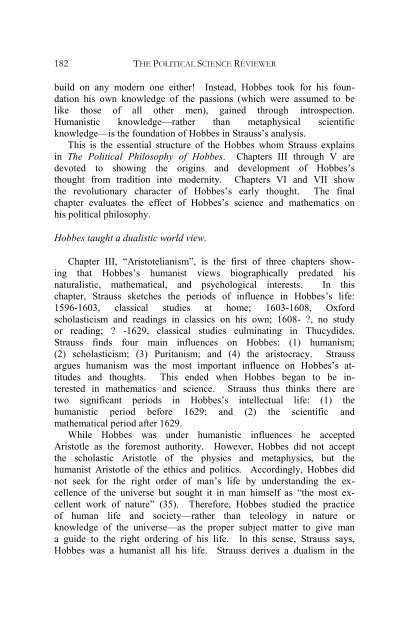Strauss and Watkins on Hobbes' Political Philosophy: A Review
Strauss and Watkins on Hobbes' Political Philosophy: A Review
Strauss and Watkins on Hobbes' Political Philosophy: A Review
You also want an ePaper? Increase the reach of your titles
YUMPU automatically turns print PDFs into web optimized ePapers that Google loves.
182 THE POLITICAL SCIENCE REVIEWER<br />
build <strong>on</strong> any modern <strong>on</strong>e either! Instead, Hobbes took for his foun-<br />
dati<strong>on</strong> his own knowledge of the passi<strong>on</strong>s (which were assumed to be<br />
like those of all other men), gained through introspecti<strong>on</strong>.<br />
Humanistic knowledge—rather than metaphysical scientific<br />
knowledge—is the foundati<strong>on</strong> of Hobbes in <str<strong>on</strong>g>Strauss</str<strong>on</strong>g>’s analysis.<br />
This is the essential structure of the Hobbes whom <str<strong>on</strong>g>Strauss</str<strong>on</strong>g> explains<br />
in The <strong>Political</strong> <strong>Philosophy</strong> of Hobbes. Chapters III through V are<br />
devoted to showing the origins <str<strong>on</strong>g>and</str<strong>on</strong>g> development of Hobbes’s<br />
thought from traditi<strong>on</strong> into modernity. Chapters VI <str<strong>on</strong>g>and</str<strong>on</strong>g> VII show<br />
the revoluti<strong>on</strong>ary character of Hobbes’s early thought. The final<br />
chapter evaluates the effect of Hobbes’s science <str<strong>on</strong>g>and</str<strong>on</strong>g> mathematics <strong>on</strong><br />
his political philosophy.<br />
Hobbes taught a dualistic world view.<br />
Chapter III, “Aristotelianism”, is the first of three chapters show-<br />
ing that Hobbes’s humanist views biographically predated his<br />
naturalistic, mathematical, <str<strong>on</strong>g>and</str<strong>on</strong>g> psychological interests. In this<br />
chapter, <str<strong>on</strong>g>Strauss</str<strong>on</strong>g> sketches the periods of influence in Hobbes’s life:<br />
1596-1603, classical studies at home; 1603-1608, Oxford<br />
scholasticism <str<strong>on</strong>g>and</str<strong>on</strong>g> readings in classics <strong>on</strong> his own; 1608- ?, no study<br />
or reading; ? -1629, classical studies culminating in Thucydides.<br />
<str<strong>on</strong>g>Strauss</str<strong>on</strong>g> finds four main influences <strong>on</strong> Hobbes: (1) humanism;<br />
(2) scholasticism; (3) Puritanism; <str<strong>on</strong>g>and</str<strong>on</strong>g> (4) the aristocracy. <str<strong>on</strong>g>Strauss</str<strong>on</strong>g><br />
argues humanism was the most important influence <strong>on</strong> Hobbes’s at-<br />
titudes <str<strong>on</strong>g>and</str<strong>on</strong>g> thoughts. This ended when Hobbes began to be in-<br />
terested in mathematics <str<strong>on</strong>g>and</str<strong>on</strong>g> science. <str<strong>on</strong>g>Strauss</str<strong>on</strong>g> thus thinks there are<br />
two significant periods in Hobbes’s intellectual life: (1) the<br />
humanistic period before 1629; <str<strong>on</strong>g>and</str<strong>on</strong>g> (2) the scientific <str<strong>on</strong>g>and</str<strong>on</strong>g><br />
mathematical period after 1629.<br />
While Hobbes was under humanistic influences he accepted<br />
Aristotle as the foremost authority. However, Hobbes did not accept<br />
the scholastic Aristotle of the physics <str<strong>on</strong>g>and</str<strong>on</strong>g> metaphysics, but the<br />
humanist Aristotle of the ethics <str<strong>on</strong>g>and</str<strong>on</strong>g> politics. Accordingly, Hobbes did<br />
not seek for the right order of man’s life by underst<str<strong>on</strong>g>and</str<strong>on</strong>g>ing the ex-<br />
cellence of the universe but sought it in man himself as “the most ex-<br />
cellent work of nature” (35). Therefore, Hobbes studied the practice<br />
of human life <str<strong>on</strong>g>and</str<strong>on</strong>g> society—rather than teleology in nature or<br />
knowledge of the universe—as the proper subject matter to give man<br />
a guide to the right ordering of his life. In this sense, <str<strong>on</strong>g>Strauss</str<strong>on</strong>g> says,<br />
Hobbes was a humanist all his life. <str<strong>on</strong>g>Strauss</str<strong>on</strong>g> derives a dualism in the
















